
In the biting chill of a winter’s day in Odesa, you can find one of the bravest women working on Ukraine’s frontline. Every week Anna puts on her body armour and, with her colleagues, fills up a large van with humanitarian supplies.
They work for local charity Heritage Ukraine with funding from Christian Aid and Scottish charity partner Blythswood. Weaving between bomb craters along muddy tracks, they head for liberated villages within shelling range.
Every trip is dangerous, but she has no hesitation in helping the villagers who are staying in their homes. Some because they want to, others because they can’t move due to poverty, old age or infirmity.
There are near misses, such as on January 25th when a Russian drone spotted the villagers crowding into an open space waiting for their delivery. Russian artillery opened fire on their three vehicles, but the team and the villagers escaped unharmed.
When we think about humanitarian aid, we picture it being a long way from the frontline. It’s about warehouses, soup kitchens and emergency shelters for displaced people.
But Christian Aid and Blythswood don’t stop there. Thanks to the money raised by the DEC we are working with local community groups to ensure our winter response is close to where it’s most needed - in villages near Russian-occupied territory close to Mykolaiv and Kherson.
Like funding Anna’s team to help those Ukrainians who can’t move to survive the harsh winter by supplying and fitting wood-burning stoves, solar lights and small generators that can also pump water from village wells.
They co-ordinate with the local and military authorities to alert villages when they’re coming and sometimes have only 15-minutes to unload before retreating to safety. Over January and February, they have delivered vital supplies to 85 settlements.
The scale of the trauma suffered by the villagers is shocking – many have experienced atrocious conditions with no power, heat, or water along with violence and abuse at the hands of Russian troops when they were under occupation. Their homes have been damaged if not destroyed - making them more vulnerable to sub-zero temperatures.
There is a collective fatigue and constant stress as the villagers grapple with the separation of families, power shortages, an economy in steep decline and the threat of bombardment. Come spring, they will face another challenge as farming communities when planting their fields: many have been mined.
Despite all the dangers, Heritage Ukraine says when they offer places to evacuate their children to Europe, they refuse:
“We are not refugees, we are citizens of Ukraine.”
Many have found strength in their faith but the help given by Anna and her Heritage Ukraine colleagues, while putting their own lives at risk, also shows an unbreakable human spirit and continuing generosity towards others. It’s this hope that is an example to us all in the face of adversity.









